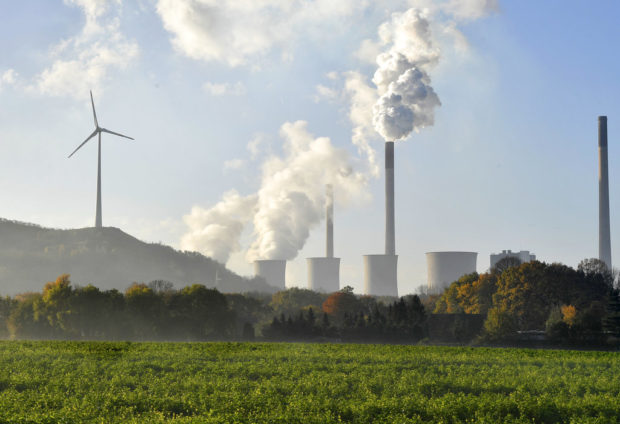Climate talks wrap up with progress on Paris rulebook

A coal-burning power plant steams in Gelsenkirchen, Germany while the 23rd UN Conference of the Parties (COP) climate talks end in Bonn, Germany, Friday, Nov. 17, 2017. (AP Photo/Martin Meissner)
BONN, Germany — Global talks on curbing climate change wrapped up Friday, with delegates and observers claiming progress on several key details of the 2015 Paris accord.
The two-week negotiations focused on a range of issues including transparency, financial assistance for poor nations and how to keep raising countries’ targets for cutting carbon emissions.
“We are making good progress on the Paris agreement work program, and we are on track to complete that work by the deadline,” Fijian Prime Minister Frank Bainimarama told diplomats hours before the meeting in Bonn, Germany, was due to conclude.
Bainimarama, who presided over the talks, faced the challenging task of reconciling the often conflicting positions of rich and poor countries, especially when it comes to what each side needs to do to curb climate change.
Signatories of the Paris agreement want to keep global warming significantly below 2 degrees Celsius (3.6 Fahrenheit) by the end of the century. That goal won’t be achieved unless countries make further efforts to sharply reduce carbon emissions caused mainly by the burning of fossil fuels.
Observers say the U.S. delegation played a largely constructive role during the talks, despite the Trump administration’s threat to pull out of the Paris accord.
While one group of American officials led by White House adviser George David Banks raised eyebrows by hosting a pro-coal event during the talks, a second group consisting of seasoned U.S. negotiators quietly got on with the painstaking job of refining the international climate rulebook, said Elliot Diringer, a veteran of such U.N. meetings.
“It’s a smaller team but a strong team,” said Diringer, who is the executive vice president of the Center for Climate and Energy Solutions, a Washington think tank. “From all accounts they have been playing a constructive role in the room advancing largely the same positions as before.”
Environmental groups voiced disappointment at German Chancellor Angela Merkel’s failure to announce a deadline for her country to stop using coal, a major source of carbon emissions, even as other nations such as Canada and Britain committed to a phase-out.
Leadership hopes are now being pinned on President Emmanuel Macron of France, who is hosting a climate summit in Paris next month to mark the second anniversary of the landmark accord.
Further low-level talks will take place over the next year in order to present leaders with final drafts for approval at the next climate meeting in Katowice, Poland, next year.